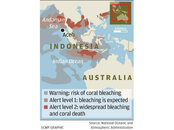Kelvinyu73
Registered
This is an article taken from South China Morning Post (Hong Kong):
Corals off Aceh dying amid warming waters
Associated Press in Jakarta
Updated on Aug 20, 2010
Coral that survived the 2004 tsunami is now dying at one of the fastest rates ever recorded because of a dramatic rise in water temperatures off northwestern Indonesia, conservationists said, warning that the threat extends to other reefs across Asia.
The Wildlife Conservation Society deployed marine biologists to Aceh province, on the tip of Sumatra island, in May when surface waters in the Andaman Sea peaked at 34 degrees Celsius, four degrees hotter than the long-term average.
The teams discovered massive bleaching, which occurs when algae living inside coral tissues are expelled. Subsequent surveys carried out with Australia's James Cook University and Indonesia's Syiah Kuala University showed 80 per cent of those corals have since died.
Though the scientists have yet to submit the data for publication in a peer-reviewed journal, they and others say the speed and extent of mortality appears to exceed that of other bleachings in recent history.
The cause appears to be the warming seas, which to some degree can be blamed on global warming.
"This is a tragedy not only for some of the world's most biodiverse coral reefs, but also for people in the region," said Caleb McClennen, the New York-based group's marine programme manager for Indonesia, noting that many depend on the rich marine life for their food and money earned through tourism.
Coral formations were severely damaged by El Nino-linked warming in 1997 and 1998. They were just bouncing back when a December 26, 2004, earthquake off Sumatra triggered a tsunami that killed more than 230,000 people in a dozen countries.
The disaster damaged more than a third of Aceh's reefs, but scientists said they recovered faster than expected, thanks largely to natural colonisation and a drop in illegal fishing.
"It's a disappointing development, particularly in light of the fact that these same corals proved resilient to other disruptions to this ecosystem," Stuart Campbell of the Wildlife Conservation Society wrote on their website.
"It is an unfortunate reminder that international efforts to curb the causes and effects of climate change must be made if these sensitive ecosystems and the vulnerable human communities ... that depend on them are to adapt and endure," he added.
The high water temperatures - which the National Oceanic and Atmospheric Administration's Coral Hotspots website indicates have affected the entire Andaman Sea and beyond - coincided with a time of little cloud cover or wind.
The hotspot has affected reefs across Indonesia as well as in Malaysia, Thailand, Vietnam and Sri Lanka, and it is now pushing its way northwards.
Given how basic coral reefs are to the ecosystem, massive changes in the coral reef survivability predicates changes to the entire food chain....
Corals off Aceh dying amid warming waters
Associated Press in Jakarta
Updated on Aug 20, 2010
Coral that survived the 2004 tsunami is now dying at one of the fastest rates ever recorded because of a dramatic rise in water temperatures off northwestern Indonesia, conservationists said, warning that the threat extends to other reefs across Asia.
The Wildlife Conservation Society deployed marine biologists to Aceh province, on the tip of Sumatra island, in May when surface waters in the Andaman Sea peaked at 34 degrees Celsius, four degrees hotter than the long-term average.
The teams discovered massive bleaching, which occurs when algae living inside coral tissues are expelled. Subsequent surveys carried out with Australia's James Cook University and Indonesia's Syiah Kuala University showed 80 per cent of those corals have since died.
Though the scientists have yet to submit the data for publication in a peer-reviewed journal, they and others say the speed and extent of mortality appears to exceed that of other bleachings in recent history.
The cause appears to be the warming seas, which to some degree can be blamed on global warming.
"This is a tragedy not only for some of the world's most biodiverse coral reefs, but also for people in the region," said Caleb McClennen, the New York-based group's marine programme manager for Indonesia, noting that many depend on the rich marine life for their food and money earned through tourism.
Coral formations were severely damaged by El Nino-linked warming in 1997 and 1998. They were just bouncing back when a December 26, 2004, earthquake off Sumatra triggered a tsunami that killed more than 230,000 people in a dozen countries.
The disaster damaged more than a third of Aceh's reefs, but scientists said they recovered faster than expected, thanks largely to natural colonisation and a drop in illegal fishing.
"It's a disappointing development, particularly in light of the fact that these same corals proved resilient to other disruptions to this ecosystem," Stuart Campbell of the Wildlife Conservation Society wrote on their website.
"It is an unfortunate reminder that international efforts to curb the causes and effects of climate change must be made if these sensitive ecosystems and the vulnerable human communities ... that depend on them are to adapt and endure," he added.
The high water temperatures - which the National Oceanic and Atmospheric Administration's Coral Hotspots website indicates have affected the entire Andaman Sea and beyond - coincided with a time of little cloud cover or wind.
The hotspot has affected reefs across Indonesia as well as in Malaysia, Thailand, Vietnam and Sri Lanka, and it is now pushing its way northwards.
Given how basic coral reefs are to the ecosystem, massive changes in the coral reef survivability predicates changes to the entire food chain....





